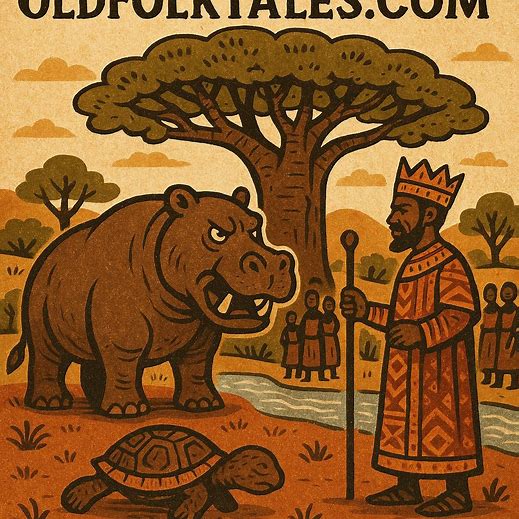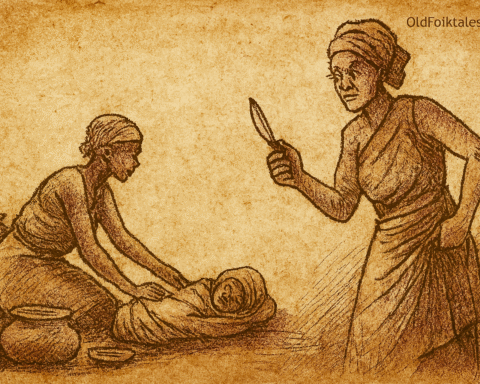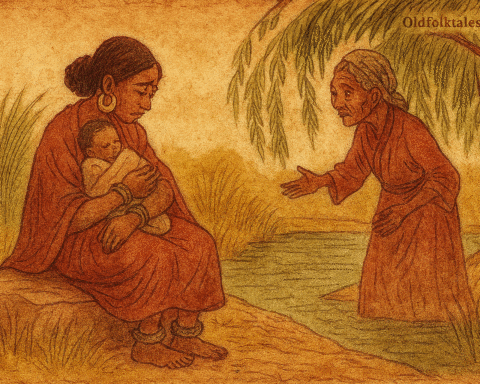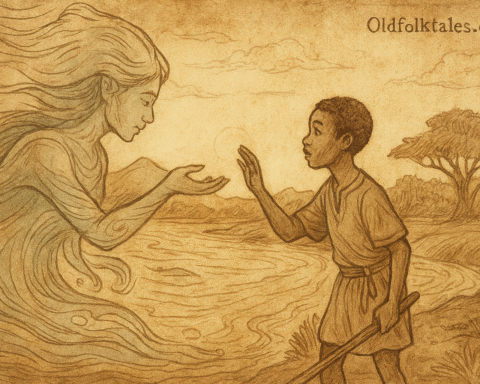Long ago, in the wide green lands where the rivers wound like silver snakes and the tall grass swayed with the whispers of the ancestors, there lived the Hippopotamus. He was a creature of great size, strength, and wealth. His farm stretched as far as the eye could see, with yams piled high, beans hanging thick, and maize golden under the sun. The people said his barns were never empty, and his harvest was always abundant.
But there was one who eyed his plenty with restless hunger. The Tortoise small, clever, and cunning. His shell was his home, but his belly was never satisfied. Each night, under the moonlight, Tortoise crept into the Hippopotamus’ farm. He nibbled on the beans, chewed the maize, and stole the ripe yams. Always cautious, always careful, he left no footprints behind.
The Hippopotamus soon grew weary of these thefts. His temper was as heavy as his body, and he swore by the ancestors that he would catch the thief. He dug pits, he set snares, he laid traps baited with food. Yet, every time, Tortoise escaped. His shell shielded him, his wit guided him, and his small size let him slip away unseen.
The Complaint Before the King
One day, furious and humiliated, Hippopotamus rose from his great farm and went before the King, who sat beneath the sacred tree at the heart of the village. His voice boomed like thunder as he spoke:
“Great King, I am wronged. My farm is stolen from, my barns are raided. I am rich, yet I am robbed by one who hides in the night. I demand justice.”
The King, wise and old, summoned all creatures to the gathering. And there, under the watchful gaze of the ancestors, the Hippopotamus faced the Tortoise.
The King asked, “Tortoise, do you steal from the farm of Hippopotamus?”
Tortoise bowed his head and answered softly, “Yes, Great King. I took his food. I am poor, and my family is hungry. I cannot match his wealth, nor his size. I am but a small creature with little to eat.”
The crowd gasped, for they expected lies. But Tortoise was bold enough to tell the truth.
The King’s Judgment
The King leaned on his staff and thought long. He looked at Hippopotamus, towering and full of wealth, and then at Tortoise, small and needy. His voice carried authority as he gave his judgment:
“Tortoise, you have confessed your theft. You shall pay a fine to Hippopotamus for his loss. But you, Hippopotamus, though you are rich, must not keep all the land to yourself. From this day, you shall live in the water, so that the poor may share in the land’s abundance.”
The court was silent, then murmured with awe. For the King’s word was final, and his justice balanced the scales between wealth and poverty.
The Fate of the Hippopotamus
With a heavy heart, the Hippopotamus obeyed. He left his wide farm and went into the rivers. His massive body sank into the cool waters, and there he remained. Since that day, the Hippopotamus has never returned to live upon the land.
When you see him rise from the water, his nostrils blowing fountains into the sky, remember the story. When you hear his deep bellow echo across the river at night, know that it is the cry of one who once owned the land but lost it through the King’s judgment.
Moral of the Story
This tale teaches that wealth carries responsibility. The rich must sometimes yield for the sake of the poor. Justice does not always favor strength or abundance but seeks balance for the whole community. The Hippopotamus, mighty though he was, had to give way so that others might live.
Knowledge Check
1. Why does the Hippopotamus live in water according to African folklore?
Because the King ordered him to leave the land and dwell in rivers after the Tortoise admitted stealing from his farm.
2. What lesson does the Hippopotamus and Tortoise story teach?
That the rich must sometimes give way to the poor, and justice seeks balance, not favoritism.
3. How did the Tortoise outwit the Hippopotamus?
By cleverly avoiding traps and using his wit to survive despite his small size.
4. What role did the King play in the tale?
The King delivered justice, fining the Tortoise but also forcing the Hippopotamus to live in water so others could share the land.
5. Why is this story important in African oral tradition?
It reflects values of fairness, balance, and the responsibilities of wealth in traditional African societies.
6. How is the Hippopotamus symbolically viewed in African folklore?
As a symbol of wealth, power, and pride, humbled by justice and forced into a life of humility in the water.
Cultural Origin
This folktale is of West African origin, shared among different communities along the Niger River.






